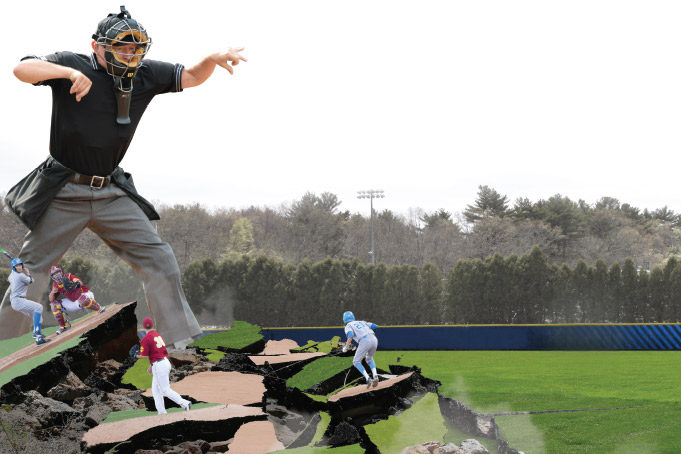The proposition is simple enough: safe or out? foul or not? catch or no catch? A good official has had hundreds of big calls in his or her career. So, what makes one at a pivotal moment of a close game any different? The consequences of screwing it up. Getting it right calls upon all the effort you’ve ever put into your career. You’ve learned to immunize yourself against a brain cramp, recognize the geometry of the play and get in the best position, not be surprised by the unexpected, shut out the surroundings and give it your best guess. Really? You lived your whole life waiting for this?
Think about it, though: There isn’t a major sport — and there are few minor ones — where some form of video review can’t be called in if the pivotal call might be wrong. We all know about football, baseball, basketball and hockey with their “nerve centers” reviewing plays and overturning them when necessary. Hey, we even see tennis players twirling their rackets while cameras track the ball and reveal the forehand volley on the line — or not. The official’s big moment can almost always be overturned by a review, which amounts to a do-over, for the teams and the officials. If that’s the situation, in its starkest contrast, then what’s the point in hiring professional officials, for hundreds of thousands per year? Can’t the leagues just hire people willing to work the games for 50 bucks? They’d need few qualifications: It certainly helps if they’ve seen the game played. Sartorial splendor in uniform would be beneficial. Most of all, they just have to call something every play. Video review would then straighten it all out. If something seems wrong to you about this, you’re on the trail of resolving the conundrum.
Officiating isn’t about making the big call and being proven right; it’s about making all the calls so routine and the games so fairly played that the participants forget about you and enjoy the occasion. If they tried to play a game using our hypothetical 50-buck extras, it would devolve quickly into monumental chaos. There would be so much uncertainty, disorganization and diatribe that Athlete’s Anarchy would soon be epidemic. Right, wrong or indifferent — we need officials primarily to run the game, but it requires the same officiating skills to make a well-officiated game commonplace as it does to make the big call correct the first time. In reality, they’re all big calls, but people just don’t notice most of them if you’re making them well.
How should officials prepare, to make what could be difficult simpler? The solution is to follow the progression we mentioned above.
Let’s dissect it:
IMMUNIZE YOURSELF AGAINST A BRAIN CRAMP
Mental lapses range from forgetting team A is now in the bonus to forgetting your trousers when you go out on the field. We can all think of examples (probably better than mine) that we worry about happening to us, when it matters and hope they won’t. The first thing to remember is that you can never be certain of avoiding errors on the field or court; no one’s ever had a perfect game. Once you come to terms with your mortality, it becomes easier to focus on the things you can control and that includes putting yourself in that happy, confident place every time before you go out there. I knew a guy that read John 3 from the Bible every time before a game. I knew another who stopped talking — sometimes in mid-sentence — one hour before a game. Those are extreme and mildly amusing tricks. The rest of us do best to use our pregame preparation to be up to the challenges when the game starts. Reminding yourself and partners of your duties, expectations and concerns in a positive way gets the mental engine warmed up and makes your thought processes active instead of passive.
The other preparation begins months, if not years, before. That’s getting your body up to the physical challenge so that the game ends before the supply of oxygenated blood to your brain. When the announcer asks, “What was the referee thinking on that call, Charlie?” there’s a good chance the poorly conditioned one was thinking about bunny rabbits or cold drinks. If you prepare properly, your only concern when you’re leaving the locker room before game time is execution.
RECOGNIZE THE GEOMETRY OF THE PLAY AND GET INTO THE BEST POSITION
On the surface, this sounds like Mechanics 101a, but it’s more than that. Yes, it helps that there’s an umpire near third base when there’s a force play there, but playing the angles successfully goes deeper. It’s about being aware of the abilities of the players, the constraints of the playing area and the possibilities of a situation. Watch an NHL linesman. First of all, a hockey puck is six ounces of frozen rubber that hurts when one hits you. An NHL hockey player is 200 pounds of negatively buoyant mesomorph who hurts you when he hits you. Calling the game is thus a combination of being in the right place and understanding what the players are thinking so you aren’t hurt. You seldom see linesmen being hit by the puck or a player because they know where to move to avoid them.
Getting the geometry right is about studying the game and adapting to the level. When you’re not surprised by how quickly you have to move or by the speed of the implement in use, it’s the difference between waiting for the play and being caught up in it.
DON’T BE SURPRISED BY THE UNEXPECTED
There are two very real strategies you can use. First is to study, question and learn your rules on a regular basis. Early in my career, I tended to memorize rules — every chapter, verse, adjective and title. I could spew out that you can’t, “… grasp, lift, lock, pull, clamp or hook” at the risk of being called for holding, but I came to realize I couldn’t always see the forest for the trees. I now believe that learning the rules is about one-part rulebook to two-parts casebook/internet to one-part refreshments consumed with other officials. If you follow this recipe for at least as long in a week as you spend on the field or court, you will reach the point where the teams can’t fool you and the rules won’t stump you.
The second element is experience, for which there is no substitute. The guy that taught me basketball officiating promised it would take 100 games before I wouldn’t have to think about executing mechanics and judging fouls well. He may have been optimistic. Whatever the number, one thing is undeniably true: With practice, repetition and exposure to enough situations, you begin to recognize plays and act rather than observe plays and react. Malcolm Gladwell wrote the book, Blink, describing how the trained brain instinctively makes decisions faster than the cognitive process can. There’s no substitute for situation recognition in making the big call.
SHUT OUT THE SURROUNDINGS
If you’re going to be a good official, you’ll develop to the point where your surroundings become immaterial. The taunts, the noise, the emotions and the smell of tar and feathers all fade if you’re wired to shut that out. Many officials eventually reach their level of incompetence when the growing magnitude of their surroundings overwhelms their sensory resistance: They can’t tolerate it anymore, lose focus, start making too many errors and exhaust the patience of the people paying them. The good news is that until you reach that point, you can keep your focus on the other things we’ve covered and be successful. You learn to want the big call, rather than dread it.
Mozart was playing music at 3 years old. Sheldon Cooper of The Big Bang Theory built his own CAT scanner at 7. The rest of us have had to work at being exceptional. Becoming the successful official I’m describing, who makes the complicated seem simple, requires effort, conviction and a healthy degree of self-actualization. You learn to see yourself as others do, decide what you have to improve and work at getting there, if you really want to.
Always bear in mind that you’re an insurance policy to the game you officiate. The more reliability you provide, the lower the premiums your benefactors think they’re paying. It all begins with how you prepare.
What's Your Call? Leave a Comment:
Note: This article is archival in nature. Rules, interpretations, mechanics, philosophies and other information may or may not be correct for the current year.
This article is the copyright of ©Referee Enterprises, Inc., and may not be republished in whole or in part online, in print or in any capacity without expressed written permission from Referee. The article is made available for educational use by individuals.


















